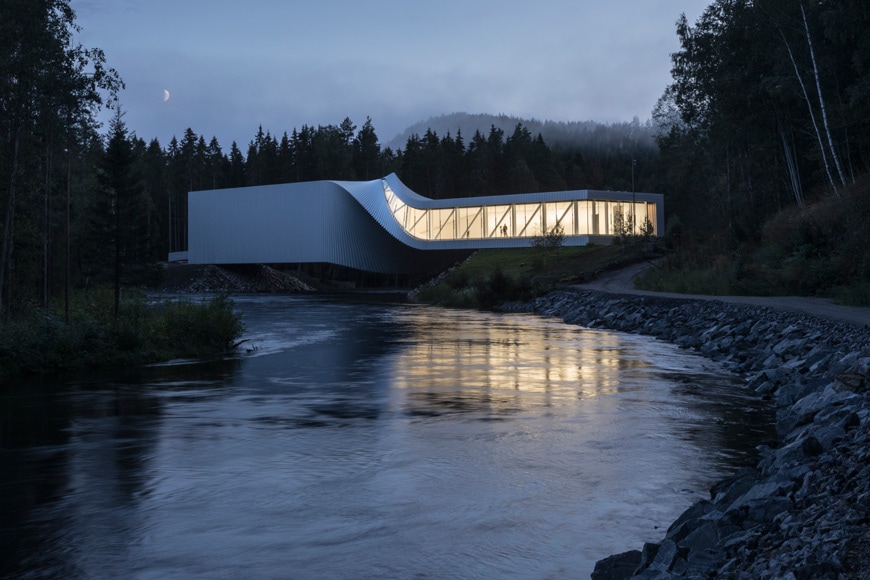“The Twist” museum in Kistefos, Norway; photo by Laurian Ghinitoiu
Bjarke Ingels’ ‘The Twist’ Bridge Museum at Kistefos Art Park, Norway
Introduction
Named “The Twist“, the much-awaited bridge-shaped museum designed by Danish architectural firm BIG – Bjarke Ingels Group at Kistefos Art Park, Norway, opened on September 18, 2019.
The building adds an impressive new venue to this industry and a contemporary art museum located in Jevnaker, a municipality about 80 kilometers north of Oslo.
“After many years of planning and development, we’re delighted to be opening this beautiful new space ‘The Twist’ at Kistefos, which will allow us to expand our work with leading contemporary artists and welcome more visitors than ever before. Our ambition is to make Kistefos a must-see cultural destination with a world-class temporary exhibition and sculpture park program to complement the rich industrial heritage of the site.” Christen Sveaas, Founder, Kistefos.
Kistefos is a very peculiar institution, located on the site of a disused mill, founded in 1889 to produce wood pulp for the paper industry. The mill, located in the forest land that borders the Ranselva River, closed in 1955 but all machinery and tools remained in place, in the false hope that the plant could return to production someday.
In 1993, Christen Sveaas, a Norwegian businessman and art collector, grandson of the Kistefos mill’s founder, acquired the complex, which comprises various buildings in an almost derelict state and several acres of land, to revamp it as an industrial museum and a sculpture park based on his collection.
The art park, inaugurated in 1996, showcases both the historical industrial plant, whose structures were recently rehabilitated, and a permanent exhibition of 25 contemporary sculptures, carefully positioned within the pulp mill’s site, including works by Olafur Eliasson, Fernando Botero, Tony Cragg, Shintaro Miyake, Claes Oldenburg / Coosje van Bruggen, John Gerrard, Anish Kapoor, and Marc Quinn, among others.
Each year, the museum also organizes a seasonal exhibition of contemporary art. So far, the Kistefos site is open to the public only in Summer, due to the cold Norwegian climate.
BIG’s design for the new museum
In 2014, the museum organized an international competition for the design of a new building, intending to expand its program of events and activities and extend its opening times.
The winning entry by BIG – Bjarke Ingels Group proposed a bridge-like building, spanning the Ranselva River, whose twisted shape somehow recalls that of their unbuilt design for the ArtA museum in the Netherlands.
The 1,400 square-meter (15,000 square-foot) building, along with accommodating exhibition galleries and service spaces, connects the two parts of the Kistefos sculpture park, which are currently linked only by a small wood bridge, and transforms the dead-end path across the open-air sculpture exhibition into a circular, continuous loop.
The twisted shape of the building is not only visually appealing; it also skilfully connects the two riverbanks, which have different elevations. Furthermore, it creates a diverse array of spaces, with two floors, stacked on one another, in the southern part of the building and a single, floor-to-ceiling hall in the northern.
Images courtesy of Bjarke Ingels Group
This spatial configuration creates exhibition spaces ideal for displaying small sculptures, paintings, photographs, and video art, in the multistory portion of the museum – which also accommodates an information center and a store, while large sculptural works and installations will be housed in the hall on the opposite side, together with a cafe with outdoor terrace.
The exhibitions in the new building should be seen as a part of the visit to the Kistefos site and complement the sculpture park and the industrial museum, creating a complex, manifold experience. In this sense, the new building is a physical and conceptual “bridge”; a metaphor for the coexistence of various perception levels and different historical periods which is the essence of the Kistefos site.
Photo by Laurian Ghinitoiu
Photos by Laurian Ghinitoiu
Project renderings, courtesy of Bjarke Ingels Group
The load-bearing structure of the addition designed by BIG is constituted by a series of portals, made of rectangular hollow steel sections; a progressive rotation of the portals creates the twisted shape of the building.
The facades combine opaque satin stainless steel sheets and “smart glass” panels. The glazed sides of the museum follow the warping of the envelope, creating a side-lit space at the northern edge of the building and a sky-lit gallery at the southern.
To control solar radiation, that could potentially lead to overheating in Summer, the glazed parts of the building are provided with a UV-reflecting coating and an electrically switchable shading system.
An interior view of the museum, photo by Laurian Ghinitoiu
Renderings, courtesy of Bjarke Ingels Group
